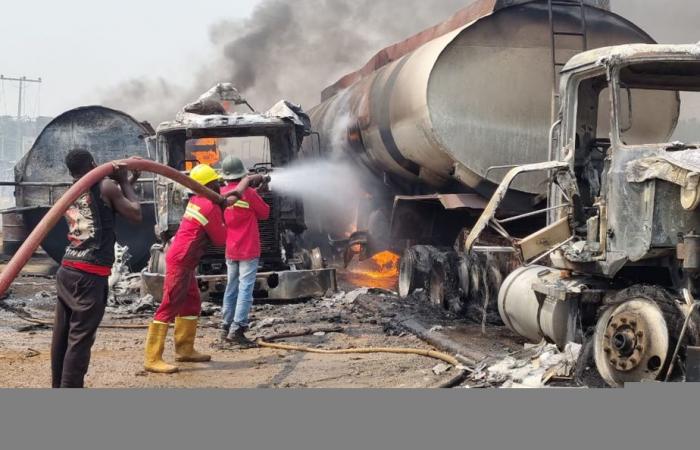(Lagos) The death toll from the explosion of a tanker truck in central Nigeria on Saturday now stands at 86 dead, emergency services told AFP on Sunday, while an initial assessment showed 70 victims. .
Posted at 11:14 a.m.
“The final toll from the tanker truck explosion is 86 dead. We buried 86 burnt bodies between 12 p.m. yesterday [samedi] and 2 a.m. today” on Sunday, said Ibrahim Audu Husseini, spokesman for the National Emergency Management Agency in Niger state, located in central Nigeria.
“It took us 14 hours to bury the bodies, because we did not have excavators and we had to call on residents to manually dig the mass grave,” Mr. Husseini said.
In addition, “52 people suffered from severe burns,” he added.
On Saturday morning around 10 a.m. (4 a.m. Eastern Time), a tanker truck carrying 60,000 liters of gasoline crashed at the Dikko junction in Niger State, on the road linking the federal capital Abuja to Kaduna city.
A crowd then gathered near the truck to collect the gasoline which was spilling onto the road when the truck exploded.
“On our way home, we arrived at the intersection where the explosion occurred. I saw a woman carrying a can of fuel and the can exploded and the fuel splashed on me. That’s how I was burned,” said Dalandi Abdullahi, 29, from the hospital where he was being treated for severe burns that ravaged his torso and arms.
“It was a generator that caused the fire and there was no water to put it out,” said Bashiru Umar, a 28-year-old trader who lost the products sold in his shops during the fire. .
“Among those burned, there were also people who just watched,” he added.
Forte inflation
The economic crisis that Nigeria has been going through for a year and a half has pushed many Nigerians into precariousness, particularly due to soaring fuel prices.
Africa’s most populous country has experienced inflation above 30% for a year, fueled in particular by the economic reforms of President Bola Ahmed Tinubu, in power since May 2023.
Among these reforms was the end of fuel subsidies, which sent food and transport prices soaring, making gasoline a catalyst for Nigerian discontent.
-Some do not hesitate to risk their lives in road accidents to recover fuel, the price of which has quintupled in 18 months.
Late last year, a report by Nigerian officials, UN agencies and major humanitarian NGOs predicted that “more than 33 million Nigerians will go hungry” in 2025.
In October, more than 170 people died in the same way in Jigawa state, in the north of Africa’s most populous country, which is also the continent’s largest oil producer.
“Tragic and avoidable”
The Nigerian president “underlined the tragic and avoidable nature of the event” in a press release released on Sunday morning.
Bola Ahmed Tinubu also ordered the launch of a national campaign that will “sensitize the public to the serious risks and environmental dangers posed by collecting fuel from fallen fuel tankers.”
“We need to raise awareness among the public so that they avoid approaching when an accident of this type occurs,” Mustapha Lamorde, a representative of the oil sector regulatory authority (NMDPRA), told the press on Sunday. came to visit the scene of the accident.
On Saturday, the governor of Niger State, Umaru Bago, invited “the population to always be responsible and give priority to their security”.
Accidents on poorly maintained roads are common in Nigeria.
Last September, an explosion caused by the collision between a tanker and a truck carrying passengers and livestock killed at least 59 people in Niger State.
In 2020, the FRSC recorded 1,531 accidents involving tankers, which caused the death of 535 people.
In addition to human and material losses, these accidents cause environmental damage due to gasoline leaks.






